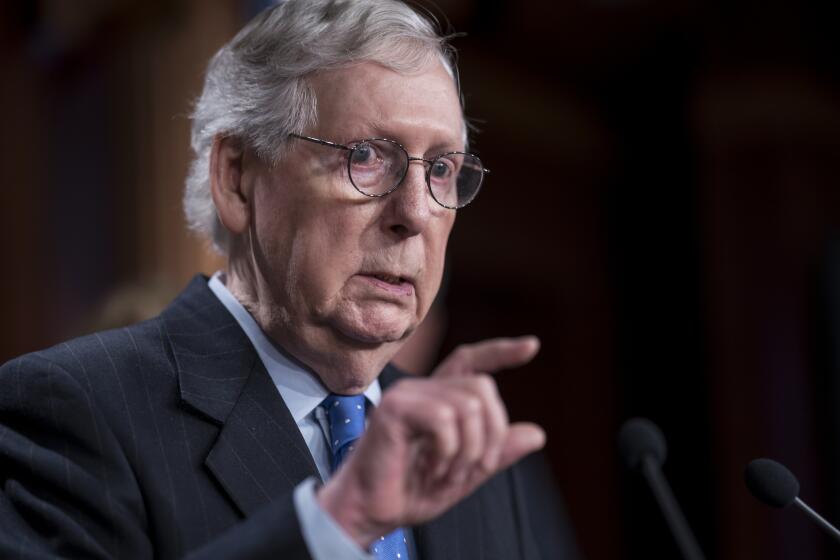Column: Is Joe Biden fatally stubborn — or virtuously tenacious?

WASHINGTON — Today is Joe Biden’s 80th birthday. Our first octogenarian president is two years older than Ronald Reagan was when his presidency ended in 1989.
Biden is still fit and energetic, but he’s also showing his age. His hair is thinner, his gait stiffer, his speech a little more garbled than when he arrived in the White House almost two years ago.
One thing hasn’t changed: He’s famously stubborn.
And now that he’s 80, it’s probably fair to describe him as a stubborn old man.
Republican losses among independent and moderate voters doomed many of their candidates. The incoming GOP House majority isn’t likely to improve that situation.
Ask anyone who’s worked for Biden, and you’ll hear a version of the same description: He listens to dissenting voices, but once he’s made up his mind, he’s almost unshakable.
“One thing I learned quickly,” a former aide told me, “you don’t tell Joe Biden what to say.”
When he is wrong, that stubbornness may be his worst vice. When he’s right, it may be his most useful virtue.
Biden’s stubbornness has helped steer his presidency into some of its deepest potholes.
It produced the debacle of the U.S. withdrawal from Kabul, when Biden dismissed pleas from the military for delay. (Asked later if he thought he had made mistakes in Afghanistan, he said: “No.”)
It shook public confidence when he prematurely declared victory over the COVID-19 pandemic, even as federal experts warned that the disease was still spreading.
This year, it drove his popularity down when he brushed off warnings of rising inflation and stuck to an economic message — “things are better than you think” — that seemed disconnected from voters’ lives.
But there’s also a form of stubbornness that’s useful — a trait more often called persistence or tenacity. The president has that, too.
His persistent support for Ukraine as it battles a Russian invasion has made him the undisputed leader of a reinvigorated North Atlantic Treaty Organization.
This fall, Biden decided the most important issue in the midterm elections was democracy — the defense of constitutional norms against the extremism of “ultra-MAGA Republicans.”
“What we’re doing now is going to determine whether democracy will long endure,” he said in one of several campaign speeches.
Pundits and political strategists criticized the message, arguing that the election would be decided on economic issues, not abstractions about democracy.
But when the returns came in, Biden turned out to be more right than wrong. An Associated Press poll found that democracy ranked a close second to inflation among voters’ concerns. A surprisingly high percentage of voters unhappy about the economy voted for Democrats nonetheless, enabling them to retain control of the Senate and lose fewer seats than expected in the House.
At a postelection news conference, the president was asked whether he saw any need to adjust his course based on the lessons of his first two years.
“I’m not going to change,” he said.
Biden’s midterm campaign theme, unsurprisingly, was an updated version of the message of his 2020 presidential campaign: a pitch for constitutional norms, a rejection of Donald Trump’s extremism.
In that campaign, candidate Biden won the Democratic nomination through sheer stubbornness, too. He finished fourth in Iowa and a disastrous fifth in New Hampshire, but stuck with a strategy that relied on winning Black voters in South Carolina and outlasting his rivals.
Long before 2020, persistence in the face of adversity was the core of Biden’s story. His national political career began in tragedy when his wife and daughter were killed in a traffic accident shortly before his swearing-in as a senator. He endured two brain aneurysms. He lost his first two attempts to win the Democratic presidential nomination — badly — but came back for a third try.
Now, at the beginning of another presidential campaign, Biden’s stubbornness has surfaced again: Will he run for reelection in 2024 at nearly 82?
The president has said repeatedly that he intends to run, and it turns out he meant it all along.
“Our intention is to run again,” he said after the midterm returns were in. “That’s been our intention regardless of what the outcome of this election was.”
People around him say the midterm results plus Trump’s entry into the race merely confirmed a decision Biden had already made.
Nothing makes him more defiant than critics saying he’s lost his stuff; nothing makes him more eager than another chance to defeat Trump.
“He feels like he’s the only one who’s beaten [Trump] before,” his former Press Secretary Jen Psaki said on MSNBC.
Asked whether polling that shows most voters don’t want him to run will affect his thinking, Biden said: “It doesn’t.”
In a CNN exit poll on election day, 67% of voters said they did not want Biden to run again. But among Democratic voters — the ones who will decide on the party’s nominee — 57% said they wanted Biden to run; 38% said they did not. That suggests the president starts the race as a clear favorite.
As for his age, Biden said recently, “It’s a legitimate thing to be concerned about.”
“I think the best way to make the judgment is to watch me. Am I slowing up?” he said. “That’s not how I feel.”
Is that stubbornness, the vice that can lead to disaster? Or is it tenacity, the virtue that leads to hard-earned success?
Don’t ask Biden; he’s not the best judge. All he knows is that stubbornness — OK, tenacity — has worked for him up to now.
More to Read
Get the L.A. Times Politics newsletter
Deeply reported insights into legislation, politics and policy from Sacramento, Washington and beyond. In your inbox three times per week.
You may occasionally receive promotional content from the Los Angeles Times.












